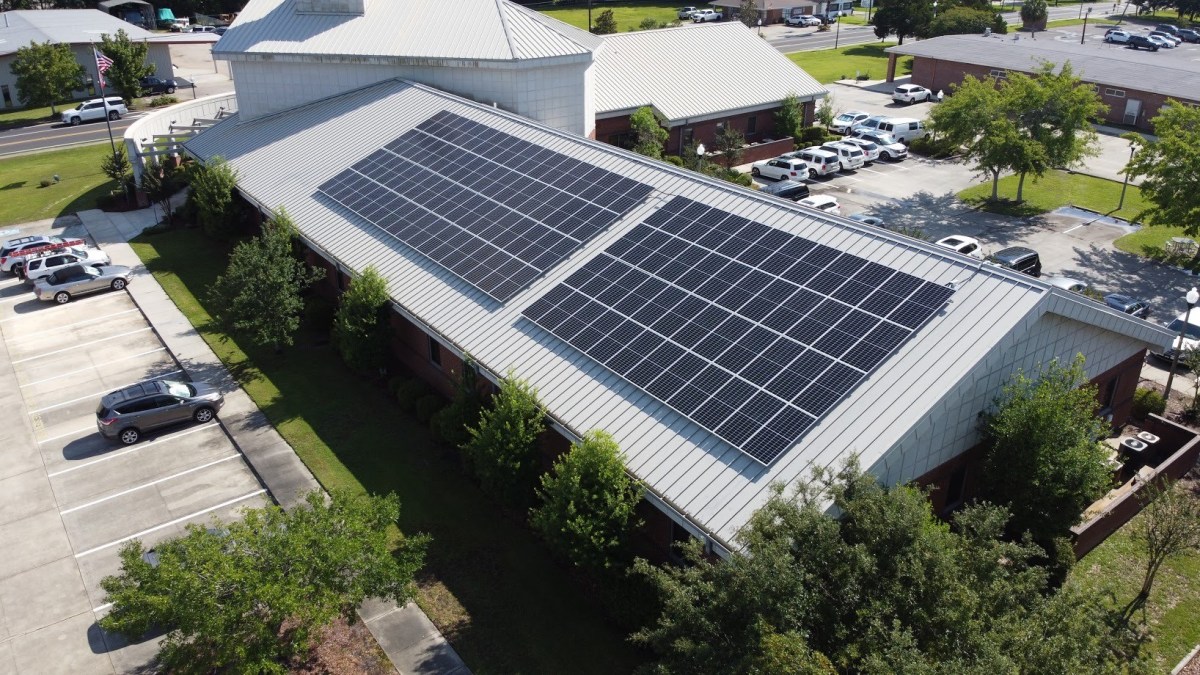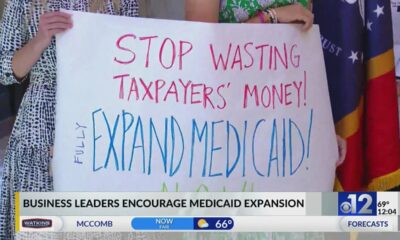Mississippi Today
Mississippi schools look to solar power to cut costs

Mississippi schools look to solar power to cut costs
A recent change to Mississippi's power generation laws, set to take effect in January, will allow over half of the state's public school districts to start saving money by generating their own solar energy.
The new rule, which the Public Service Commission agreed to with the state's two investor-owned utilities in October, paves the way for school districts to earn credits for generating solar power without actually having to pay for the solar panels.
Starting in 2023, any of the 95 public school districts served by Entergy Mississippi or Mississippi Power can enter into what's called a power purchase agreement, where a third-party contractor foots the bill to add solar panels to the school district's property. Entergy or Mississippi Power would then buy the generated solar power and credit the district on its energy bill. For funding the new system, the contractor would be eligible for government tax credits.
While the rule change opens a door for widespread renewable energy use in Mississippi, a few of the state's school districts are already generating solar power, with some seeing new wiggle room in their budgets.
“It's been a very, very big win for the district,” said Mike Papas, director of Auxiliary Services at the Forrest County School District.
Last year, Forrest County School District finished installing 300 solar panels on the roof of its performing arts center, which it uses for events like school plays and faculty meetings. The building, Papas said, seats 900 people and needs constant air conditioning. But because the solar panels create $3,000 a month worth of electricity, he said, they cover more than half of the center's electric bill.
“For us to be able to produce clean energy, then for us to take that money and put it back into the budget to do what's needed for the students, we couldn't lose,” Papas said. “And plus it was free.”
In 2014, the Sierra Club reached a settlement with Mississippi Power over the utility's now-infamous failed clean coal project in Kemper County. The two sides agreed to direct $15 million towards solar projects for schools as well as energy efficiency upgrades for low-income homes.
“(The Kemper project) was pretty bad for a lot of folks, but something good came out of it,” said Rodger Wilder, president of the Mississippi Gulf Coast Community Foundation.
So far, that money has paid for solar panels at a dozen school districts, including all the panels at Forrest County School District. Interested school districts in the Mississippi Power service area can still receive funding from the Coast foundation, which was put in charge of administering the $15 million. Districts receive grants of around $250,000 to pay for solar panels as well as to introduce renewable energy into their curriculum.
Brooks McKay, director of operations at the Ocean Springs School District, said he and others were skeptical of how solar panels would be able to withstand hurricanes.
“There's a little bit of hesitation on the Coast to put something on the roof worth $250,000 that you don't know is gonna blow off or not,” he said.
But McKay said the panels have held up fine since the district put them on top of its central office building two years ago, and now the district is already looking to take advantage of the PSC's rule change to add more solar panels in the near future.
“What we don't spend on energy we can spend on (other things),” said McKay, who estimated that the district saves about $300 a month on its electric bill during the summer. “It could be teacher units, classroom supplies, buses is one area we really put some savings in.”
Other districts around the state could soon be lining up as well: During the PSC's public comment period on updating the net metering rule, superintendents from the following districts wrote in support of expanding renewable energy opportunities to schools: Attala County, Enterprise, Greenville, Kemper County, Lauderdale County, Okolona, Union, Winona-Montgomery, Yazoo County and Newton County.
School districts in the Mississippi Power service area interested in grant opportunities to fund solar panel installations can reach out to GCCF. A list of districts in the Mississippi Power and Entergy Mississippi service areas is available here.
This article first appeared on Mississippi Today and is republished here under a Creative Commons license.
Did you miss our previous article...
https://www.biloxinewsevents.com/?p=201770
Mississippi Today
North Mississippi business leaders urge Legislature to pass Medicaid expansion
A group of business leaders from northeast Mississippi, one of the most conservative areas of the state, recently wrote a letter to House Speaker Jason White encouraging lawmakers to expand Medicaid coverage to the working poor.
The letter, signed by influential Itawamba County business owner and Republican donor Luke Mongtomery, thanked White for pressing forward with Medicaid expansion legislation and called it “the most important legislative issue for the 2024 session.”
“As this bill now goes to our legislators appointed to the conference committee for consideration, I have faith that a workable solution will be developed that is agreeable among House and Senate leaders,” Montgomery wrote. “Legislation that is good for our future and for all Mississippians.”
Montgomery wrote the letter on behalf of Mississippi Hills Leadership PAC, a committee of north Mississippi business leaders who regularly donate to statewide politicians and dozens of conservative legislative candidates.
Montgomery is the current chairman of the PAC, while Dan Rollins, CEO of Tupelo-based Cadence Bank, serves as the vice vice chairman and David Rumbarger, CEO of Lee County's Community Development Foundation, serves as its treasurer.
The PAC last year donated $50,000 to White's campaign, $50,000 to a PAC White controls, $50,000 to Hosemann and thousands of dollars to lawmakers, according to campaign finance reports with the secretary of state's office.
Business and civic leaders in northeast Mississippi such as Jack Reed Sr., George McLean, Hassell Franklin and Bobby Martin, all of whom have since passed away, had a longstanding history of advocating for political causes in the region.
But in modern times, business leaders from the area are careful to wade into political issues beyond the typical scope of local business interests.
Montgomery told Mississippi Today in a statement that the PAC's leaders support White, a Republican from West, and Hosemann, the leader of the Senate, for realizing the importance of passing expansion legislation.
“The Mississippi Hills Leadership PAC fully supports our House and Senate leaders as they work together to develop a responsible healthcare expansion plan that takes full advantage of available federal support for the benefit of our hospitals, our people, and our future,” Montgomery said.
The letter comes in the middle of House and Senate leaders attempting to hammer out a compromise in a conference committee to resolve the different expansion plans the chambers have proposed.
The House's expansion plan aims to expand health care coverage to upwards of 200,000 Mississippians, and accept $1 billion a year in federal money to cover it, as most other states have done.
The Senate, on the other hand, wants a more restrictive program, to expand Medicaid to cover around 40,000 people, turn down the federal money, and require proof that recipients are working at least 30 hours a week.
Montgomery's letter did not endorse a specific plan, but it did call the House's plan, which expanded coverage to the full 138% of the federal poverty level under the Affordable Care Act, “a reasonable and responsible proposal.”
A potential compromise is for the two chambers to agree on a “MarketPlus Hybrid Plan,” which health policy experts with the Center for Mississippi Health Policy and the Hilltop Institute at the University of Maryland, Baltimore County estimate could save the state money in the long-term.
Speaker White previously told Mississippi Today in an interview that he believes he can hold a bipartisan group of more than 90 House members, a veto-proof majority, together in support of a compromise expansion package.
But the coalition of support in the 52-member Senate is more fragile. The Capitol's upper chamber only passed its austere expansion plan by 36 votes, with only one vote to spare for the two-thirds threshold needed to override a governor's veto.
In addition to Hosemann, the PAC has donated money to the following senators: Kathy Chism, R-New Albany; Rita Potts Parks, R-Corinth; Daniel Sparks, R-Belmont; Chad McMahan, R-Guntown; Hob Bryan, D-Amory; Ben Suber, R-Bruce; Dean Kirby, R-Pearl; Briggs Hopson, R-Vicksburg and Josh Harkins, R-Flowood.
Jack Reed Jr., the former Republican mayor of Tupelo and the CEO of Reed's Department Store, an economic anchor of downtown Tupelo, is also expected to be at the Capitol on Tuesday morning to advocate for expansion.
This article first appeared on Mississippi Today and is republished here under a Creative Commons license.
Mississippi Today
On this day in 1892


April 22, 1892

Fiery civil rights pioneer Vernon Johns was born in Darlington Heights, Virginia, in Prince Edward County. He taught himself German and other languages so well that when the dean of Oberlin College handed him a book of German scripture, Johns easily passed, won admission and became the top student at Oberlin College.
In 1948, the Dexter Avenue Baptist Church in Montgomery, Alabama, hired Johns, who mesmerized the crowd with his photographic memory of scripture. But he butted heads with the middle-class congregation when he chastised members for disliking muddy manual labor, selling cabbages, hams and watermelons on the streets near the state capitol.
He pressed civil rights issues, helping Black rape victims bring their cases to authorities, ordering a meal from a white restaurant and refusing to sit in the back of a bus. No one in the congregation followed his lead, and turmoil continued to rise between the pastor and his parishioners.
In May 1953, he resigned, returning to his family farm. His successor? A young preacher named Martin Luther King Jr.
James Earl Jones portrayed the eccentric pastor in the 1994 TV film, “Road to Freedom: The Vernon Johns Story,” and historian Taylor Branch profiled Johns in his Pulitzer-winning “Parting the Waters; America in the King Years 1954-63.”
This article first appeared on Mississippi Today and is republished here under a Creative Commons license.
Did you miss our previous article…
https://www.biloxinewsevents.com/?p=351711
Mississippi Today
Podcast: Rep. Sam Creekmore says Legislature is making progress on public health, mental health reforms

House Public Health Chairman Sam Creekmore, R-New Albany, tells Mississippi Today's Geoff Pender and Taylor Vance he's hopeful he and other negotiators can strike a deal on Medicaid expansion to address dire issues in the unhealthiest state.
This article first appeared on Mississippi Today and is republished here under a Creative Commons license.
Did you miss our previous article…
https://www.biloxinewsevents.com/?p=351583
-
SuperTalk FM6 days ago
Chance of parole denied for man who killed 3 Choctaw Indian tribal members
-
SuperTalk FM6 days ago
2 arrested after missing man’s body found on side of Mississippi highway
-
Mississippi News5 days ago
What this means for local schools
-
228Sports3 days ago
From Heartbreak to Hoop Dreams: Pascagoula Panthers Springboard from Semifinal Setback to College Courts
-
Kaiser Health News6 days ago
To Stop Fentanyl Deaths in Philadelphia, Knocking on Doors and Handing Out Overdose Kits
-
Mississippi News2 days ago
2 dead, 6 hurt in shooting at Memphis, Tennessee block party: police
-
Mississippi News5 days ago
Willis Miller sentenced to 45 years in prison, mandatory
-
Mississippi News2 days ago
Forest landowners can apply for federal emergency loans







































